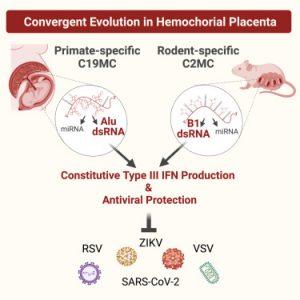In a recent study, researchers have described the mechanisms underlying anti-viral protection of the fetus during pregnancy (Figure 1). The investigation primarily targeted viruses that pose a significant threat to both the pregnant mother and the fetus. Due to their vulnerable immune systems, the developing fetus is particularly susceptible to infections, making it crucial to understand how they are shielded from potential harm. This study shed light on the defence mechanisms of the placenta, the first organ to form in both humans and mice, which serves as a barrier between the mother and fetus.
As the placenta is continuously exposed to maternal blood, the risk of viral transmission from the mother to the fetus is heightened. Consequently, the placenta has evolved robust protective measures to prevent such transmission. The researchers discovered a gene within the placenta that is exclusively expressed from the paternal allele. This gene activates a viral mimicry response, effectively tricking the placenta into perceiving an infection and subsequently initiating a constant state of antiviral defence.
By understanding how the fetus is safeguarded from viral threats, scientists can potentially apply this knowledge to other areas of medicine. This newfound understanding may pave the way for the development of novel antiviral therapies and interventions that mimic the placenta’s protective mechanisms. Consequently, this research holds promise for combating not only viral infections during pregnancy but also other viral diseases affecting individuals across various stages of life.
Journal article: Wickramage, I., et al, 2023. SINE RNA of the imprinted miRNA clusters mediates constitutive type III interferon expression and antiviral protection in hemochorial placentas. Cell Host & Microbe.
Summary by Stefan Botha











